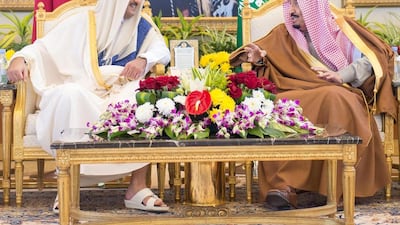The Emir of Qatar, Tamim Al Thani, received a letter from King Salman of Saudi Arabia late on Tuesday in the first correspondence since the boycott of Doha began in June 2017.
Saudi Arabia, along with the UAE and Bahrain, have been embroiled in a diplomatic spat with Doha that has seen previously close ties between the Gulf neighbours break down.
Kuwait state news agency reported that the Emir received a written letter from the Custodian of the Two Holy Mosques, hand-delivered by the Secretary General of the GCC, Dr Abdullatif Al Zayani. Qatar state news agency also reported the same.
It is unclear whether Emir Tamim will represent his country at the GCC conference to be held in Riyadh on December 9. At last year’s summit in Kuwait, Qatar was the only state from the six-nation bloc to send their head of state to the meeting. But his absence from the Arab League summit in Saudi Arabia earlier this year suggests he may be avoiding meetings in the Kingdom behind the boycott.
A Kuwaiti official cautioned that rapprochement is not necessarily imminent.
“This summit in my opinion will not resolve Qatar crisis, there’s too much tension," an official in the Kuwaiti royal palace said. "Kuwait has always been supportive but I think we’ve reached a point that we’re there to observe and listen rather than fix matters.”
The official, who spoke anonymously as they were not authorised to brief the media, said that Kuwait's Emir Sabah Al Ahmed continues to serve the role of chief mediator but reconciliation will remain a decision both sides must reach together.
Although not much is expected from the talks, the two sides' willingness to engage in dialogue is a “small step” towards a more positive relationship, said Michael Stephens, research fellow at the Royal United Services Institute for Defence and Security Studies. “I think it’s actually a positive sign," he said. "No matter what it goes through – and even if it’s a moribund institution politically – I think the framework of the GCC would still survive.”
Regardless of the differences in the GCC, the member states still share enough economic and security challenges that working together serves their individual interests, Mr Stephens said. “There is common thinking and a common approach and I think ultimately for all sides that they’re at least being seen as trying to co-operate.”
Since the dispute broke out, the royal families from the two sides have had little contact, with the exception of a phone call between the Crown Prince Mohammed bin Salman and Emir Tamim that turned sour.
The call came months after the initial announcement of the boycott and was believed to be an attempt at reconciliation. Media coverage of the call from both the Saudi and Qatari sides reported conflicting details on which side reached out initially, and afterwards Riyadh denounced any prospect for dialogue.
The dispute with Qatar is not the region's first. In 2014, the three countries recalled their ambassadors from Doha over Qatar’s support for the Muslim Brotherhood, which the three Gulf states view as undermining their domestic security.
The 2014 crisis lasted eight months and was resolved in an emergency meeting in Riyadh where the countries vowed to turn over a new leaf.
The Qatari news agency reported that Emir Tamim is travelling to Malaysia on a “working visit” and did not indicate when he would return.
This invite follows Qatar's abrupt withdrawal from Opec to focus on gas production — a move many say was aimed at Saudi Arabia and its allies.
Apart from crude, Qatar sits on the world's third-largest gas reserves and is the number-one producer of liquefied natural gas.
___________
Read more:
Qatar 'isolating itself' as GCC countries get ready to meet in Saudi Arabia for summit
Opec to convene amid concerns over consensus and Qatar's looming exit
Quicktake: why is Qatar leaving Opec?
___________

